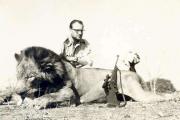
History of Coutada 9 » The Golden Years (1959 - 1973)
During the 1950’s, the Portuguese Government decided to regulate and control hunting within their colonies. Having seen and noted the booming safari industries of Kenya and Tanganyika (Tanzania) and heeding the call for protection of the countries wildlife. The practice of “Professional Hunting” by the likes of Harry Manners, John “Pondoro” Taylor and Joseph Gustave Guex, who hunted in their personal capacity with little if any regulation or restriction, was brought to an end. The hunting of ivory was banned in 1953 and the meat trade was banned in 1957. In 1959, Government regulations were implemented that would allow for “Safari Hunting”. These included, the creation of Coutadas (Wildlife Reserves) specifically for touristic hunting, the setting of respective offtake quotas for the coutadas’, tag fees for each species and a system for the licensing of a new breed of “Professional Hunting Guides”. Where their predecessors had financed themselves through the sale of the ivory, skins and meat obtained through their personal hunting, they would now be paid to guide foreign tourists to hunt Mozambique’s wildlife. The Government, through license and tag fees earned revenue from the country’s wildlife resource and the local communities received the meat from the safaris as their benefit.
Coutada 9 was originally leased to Beira Tourism Agency, owned and operated by the Pires family. The Pires’ family were farmers who had established a trading center at Guru on the western border of the coutada. The safaris of this era are well documented by Adelino Serra Pires in his book ‘The Winds of Havoc”. In 1964 Coutada 9, along with eight other coutadas, were taken over by the “Banco Nacional Ultramarino” (Colonial Portugal’s, Overseas National Bank) and the company Safari Safrique was formed. Where the original operators in their personal capacities could not afford to develop these areas, the bank could. In 1965, the equivalent of One and a half million US dollars, a massive amount at the time, was invested in the areas. This allowed for development of the areas, roads and airstrips were opened, luxury hunting camps built and the vehicle fleet upgraded along with radio communications and other equipment. Safrique was to become one the largest Safari companies in the world during the 60’s and 70’s, hosting many famous hunting clients, including the Astronauts Colonel Stuart Roosa and Captain James Lovell, war hero General Doolittle, world re-known actor Roy Rogers, the Rothschild family and several European Royals among many others. Well-known safari outfitter, Bert Klineberger, referred to the area as some of the finest hunting Africa had ever known.
However, these glory years came to an abrupt end in 1973 with Mozambique’s independence struggle from colonial Portugal escalating and guerilla forces ransacking and destroying one of Safrique’s safari camps followed by an attack that resulted in the death of a client. Independence from Portugal was gained in 1975, however any hope of revival of the industry was put to an end in 1977 with the outbreak of civil war between the rival factions of FRELIMO (Fronte de Libertação de Moçambique) and RENAMO (Resistência Nacional Moçambicana).




